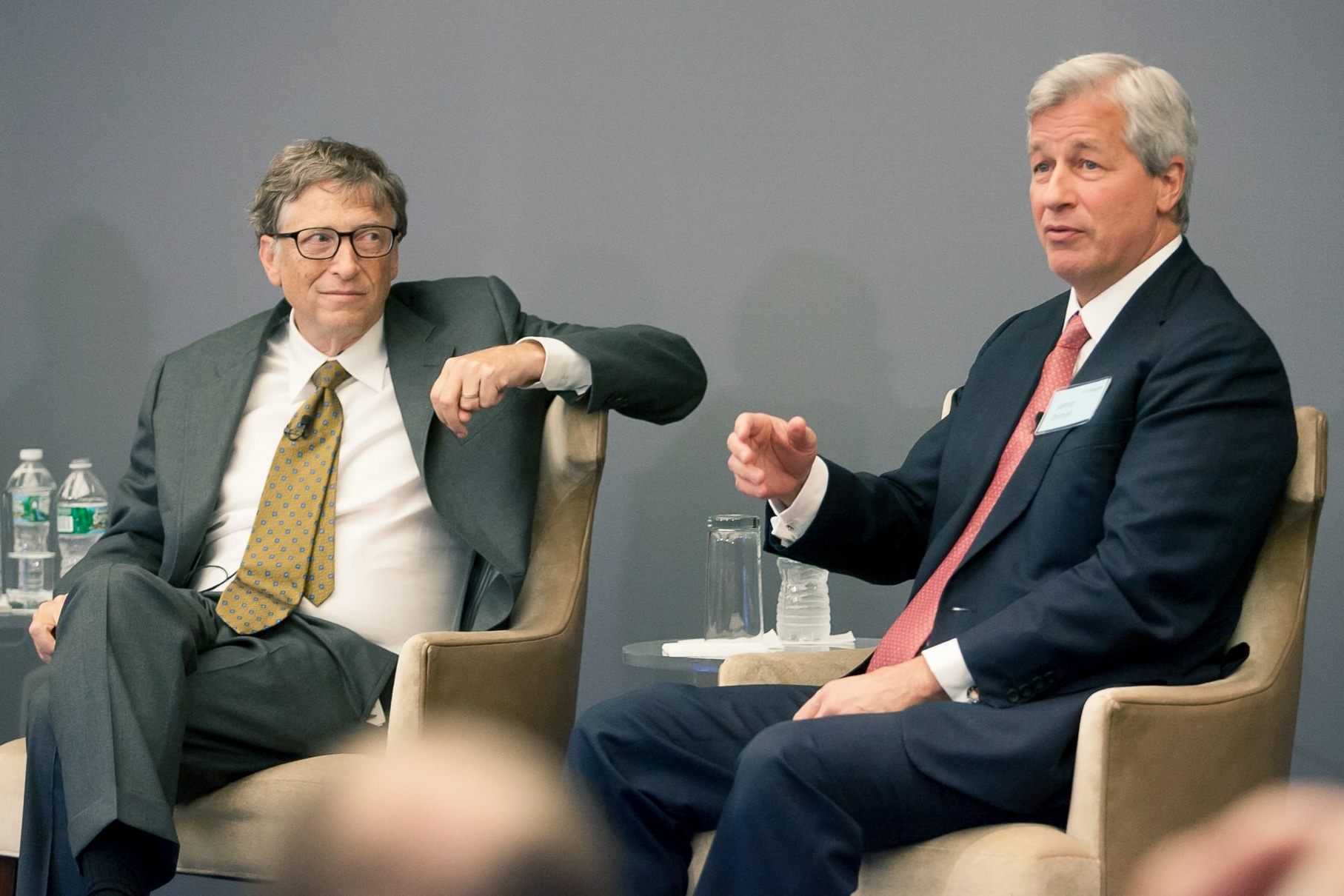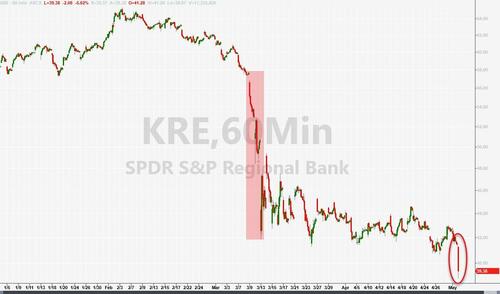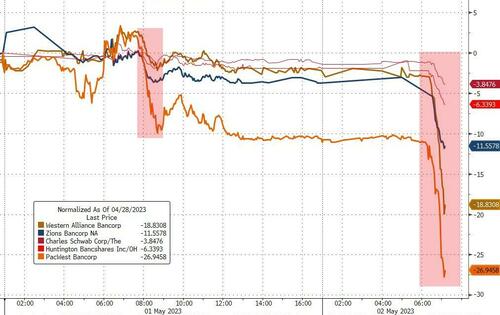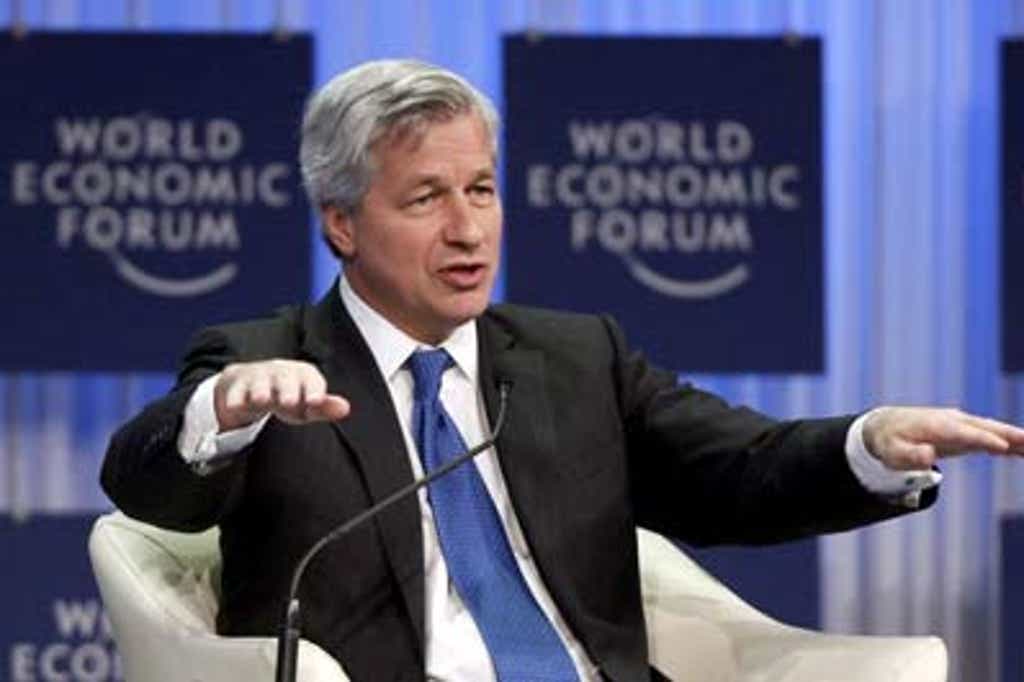by Brian Shilhavy, Health Impact News:
 Another blood bath in American banks was seen today in stock market trading, with a “total collapse” of regional banks.
Another blood bath in American banks was seen today in stock market trading, with a “total collapse” of regional banks.
And despite the Biden admin claiming that FRC was just another ‘outlier’ business model, PacWest, Western Alliance, and Zions (among others) are in a freefall…
This follows the collapse of the second largest bank in U.S. history that occurred over this past weekend with First Republic Bank.
TRUTH LIVES on at https://sgtreport.tv/


On Monday morning, JPMorgan Chase CEO Jamie Dimon, who stepped in to purchase the remaining assets of First Republic Bank at bargain rates, announced that the U.S. Banking system is “very, very sound.”
After another massive bank failure – and taxpayer-funded bailout – JPMorgan CEO Jamie Dimon told listeners on an investor call this morning that “The system is very, very sound.”
Doesn’t seem like it Jamie, old chap?
But hey, whatever you say now as the CEO of a bank that holds over 10% of America’s deposits.
“We need large, successful banks in the largest economy,” Dimon continued, proclaiming that “this is nothing like ’08 or ’09.”
Well he is right, in so much as this is far larger… and we really don’t know where the CRE holes on bank balance sheets are (even as Charlie Munger warns they are everywhere). (Source.)
Pam Martens of Wall Street on Parade, who has extensively covered the multiple felony charges that have been filed against Jamie Dimon over the years since he took over at Chase, published an article this morning explaining how we cannot trust Dimon’s statements that he is “saving” the banking industry, because he is one of the main reasons these smaller banks are failing in the first place.
There Was a Blood Bath in Some Bank Stocks Yesterday: So Much for Jamie Dimon’s Prediction That It’s the End of the Banking Crisis
There are two critical things you need to know about JPMorgan Chase’s Chairman and CEO Jamie Dimon’s ability to stabilize the banking crisis: (1) he’s tried twice and failed both times; (2) his bank is a key financier of hedge funds, some of which are undermining bank stock prices with short selling.
The Financial Times reported on April 5 that “Hedge funds made more than $7bn in profits by betting against bank shares during the recent crisis that rocked the sector, their biggest such haul since the 2008 financial crisis.”
Shares of First Republic Bank have lost billions of dollars more in market value since April 5, meaning the $7 billion haul for short sellers is now an understatement.
The one thing that would help dramatically to stem the banking crisis is for President Biden to immediately issue an Executive Order halting the short selling of federally-insured bank stocks.
As of right now, short sellers see an easy path to picking a regional or community bank target, or a bank that got in bed with crypto companies, or some inscrutable federally-insured fintech bank, and driving its share price into the ground while minting billions for themselves.
This is now a matter of national security to the United States.
The second largest bank failure in U.S. history just occurred on May 1 with First Republic Bank. The third largest bank failure in U.S. history occurred on March 10 with Silicon Valley Bank. The fourth largest bank failure in U.S. history occurred on March 12 with Signature Bank.
In each case, the Federal Deposit Insurance Corporation (FDIC), the federal agency that insures bank deposits up to $250,000 per depositor per bank, was on the hook for losses on underwater assets at the banks.
It will book tens of billions of dollars in losses to its Deposit Insurance Fund as a result. (The largest bank failure in U.S. history was Washington Mutual. That occurred in 2008. JPMorgan Chase was allowed to take it over, just as happened with First Republic Bank yesterday.) (Full article.)
Is Jamie Dimon Looking to Take Over Big Tech?

As mentioned above, Jamie Dimon’s Bank now holds over 10% of America’s deposits, and that percentage will only increase as more and more smaller banks collapse.
Most of these banks that have failed so far have been with banks holding the deposits of venture capitalists and billionaires from Big Tech. Some are now speculating that Dimon is looking to start dominating Silicon Valley, and have a greater influence with Big Tech.
JPMorgan’s Silicon Valley Moment
When business payments firm Bill.com went public in November 2019, the banks leading the initial public offering included Goldman Sachs, Bank of America and Jefferies. Missing was JPMorgan Chase, despite the fact that it had worked closely with the Palo Alto, Calif.–based company.
Among other endeavors, JPMorgan made a strategic investment when it led Bill.com’s $100 million financing round in 2017 and even inked a deal to integrate the firm’s payments technology into its own Chase platform. But JPMorgan decided to skip the IPO.
A person close to the deal said JPMorgan pulled out because it wanted a larger role than Bill.com offered it, meaning the bank wouldn’t get the bigger fees and bragging rights that come with a lead position. A person familiar with JPMorgan’s thinking said the economics of the deal didn’t stack up for the bank, so it chose to opt out.
A little over six months after Bill.com’s IPO, JPMorgan transferred its stake in Bill.com, then worth $100 million, to its charity arm, which liquidated it days later. The person familiar with the bank’s thinking said there was nothing unusual about that sale, which de-risked JPMorgan’s strategic investments.
JPMorgan has already won a flood of new clients who fled Silicon Valley Bank over the past few weeks following its collapse. On Monday, every customer of First Republic learned JPMorgan had bought their bank and assumed their accounts, giving it even more access to the technology industry and many high-net-worth people from Silicon Valley who banked at First Republic.
Those moves could give JPMorgan more opportunity to bolster its relations in the Valley.
“JPMorgan has a decades long presence in Silicon Valley, with well-established relationships across the corporate, venture and startup community,” a JPMorgan spokesperson said.
“We welcomed thousands more in recent weeks so they could continue to run their businesses without interruption.…We are committed to the innovation economy and excited about the opportunities to do even more.” (Full article – Subscription needed.)
Analysis: This Could be the Next Step in the “Great Reset” and Digital Control

As things have unfolded here in the first 4 months of 2023, I think I am seeing a pattern now of where this all might be going, and how we might now be at the start of the next phase of the “Great Reset,” and the desire of the Globalists to take digital control over the population as the U.S. economy crashes.
This phase actually began in November of 2022, with the roll-out of Microsoft’s AI ChatGPT. Even though this AI app had many problems and consistently gave wrong or bad information, it quickly became the fastest and most downloaded app of all time, even surpassing TikTok, as hundreds of millions of people downloaded it out of fascination to see what it could do.
The sheer amount of downloads sent panic throughout Big Tech, as everyone was afraid of being left in the dust on this new frenzy that Microsoft had created.
Read More @ HealthImpactNews.com





